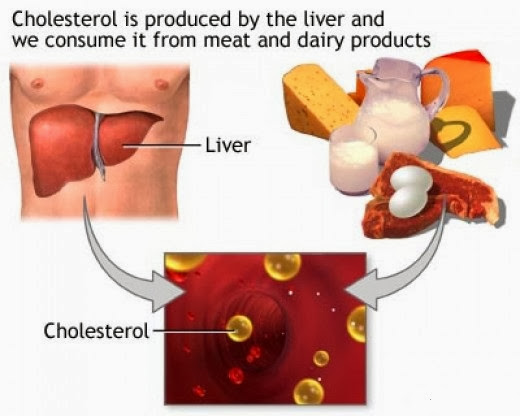| ways to lower cholesterol |
17 % of French people suffer from high cholesterol , abnormal elevation of cholesterol in the blood.
That's a lot , so much so that a 5% reduction in the average cholesterol adult population has become a priority NFHP (Programme National Nutrition Santé) .
But what is cholesterol? Where does it come from? How to limit its impact on health? Is there an anti cholesterol diet ? Let the point.
The anti cholesterol diet is to reduce the consumption of acid gras.Le anti cholesterol diet is to reduce the intake of fatty acids. - The anti- cholesterol diet
The anti cholesterol diet is to reduce the consumption of fatty acids .
What is cholesterol?
Cholesterol is a complex molecule transported by various forms of lipoproteins.
Essential to the body , it has - when present in right amount - a beneficial role , since it is involved in the structure and function of cell membranes, in the production of many hormones (cortisone , progesterone, testosterone ) in the transport and digestion of fats.
There are 2 kinds of cholesterol, which , added together, make up the total cholesterol :
> LDL cholesterol, commonly called " bad cholesterol " deposits in the vessels when present in excessive quantities or misused by the cells. He represents a factor of cardiovascular risk formally established .
> HDL cholesterol, commonly called "good cholesterol" , is part of the anti-atherogenic cholesterol , that is to say, it occurs against the deposition of cholesterol in the blood vessels .
Where do we find the cholesterol ?
Contrary to popular belief , the main source of cholesterol is not the foods that contain consumption (30 %), but the endogenous synthesis (70%) , that is to say, the manufacture or misuse of this molecule in the body itself.
Thus, dietary factors that influence its synthesis is not only the quantity of ingested foods containing (eggs , dairy products, seafood , meat ) , but the restriction, meal frequency and type of fat consumed . A key role is assigned to fat , not just quantity, but also their nature.
Overall, we consider that the saturated fatty acids on the one hand , and trans fatty acids (from the partial hydrogenation of vegetable and fat present in pastries , cakes , fries ... ) on the other hand are strongly associated at an elevation above the total LDL cholesterol , while the unsaturated fatty acids (vegetable oils , fatty fish , nuts ... ) induce a lowering cholesterol, especially LDL .
Antioxidants lower the levels of bad cholestérol.Les antioxidants lower the bad cholesterol .
Antioxidants lower the bad cholesterol .
Other dietary factors are also associated with lower cholesterol levels in the blood, dietary fiber, plant sterols and globally, all plant products (fruits and vegetables , whole grains, legumes , nuts ) .
In addition , epidemiological studies have shown that there are other influential factors. Primo physical activity , reducing overweight , lowering triglycerides and smoking cessation increase good cholesterol.
Secondly, the consumption of foods rich in antioxidants ( plant products , oils, fish) would likely make less atherogenic LDL cholesterol .
Finally, note that the excess production or insufficient use of cholesterol in the body can be genetic or drug-induced .
| ways to lower cholesterol |
What anti cholesterol to lower levels in the blood system ?
To reduce total cholesterol and especially LDL or "bad cholesterol" , there are so many anti cholesterol measures :
> Avoid weight gain through daily physical activity and a reduction in dietary fat ( fat foods , fried and fatty cooking ... ) in favor of including complex carbohydrates (starches , grains) and fiber (fruits and vegetables).
> Rebalancing power by reducing the accumulation of saturated fats ( meat, sausage , cheese, cream , butter) and trans fats (hydrogenated hard margarines , pastries, croissants and similar products) , and a moderate use and adequate vegetable oils and non-hydrogenated soft (in tub) margarine for spreading , cooking and seasoning .
> Limit the consumption of foods rich in cholesterol offal (2 times per month max) , eggs ( 2 per week ) and shellfish (2 times per month).

